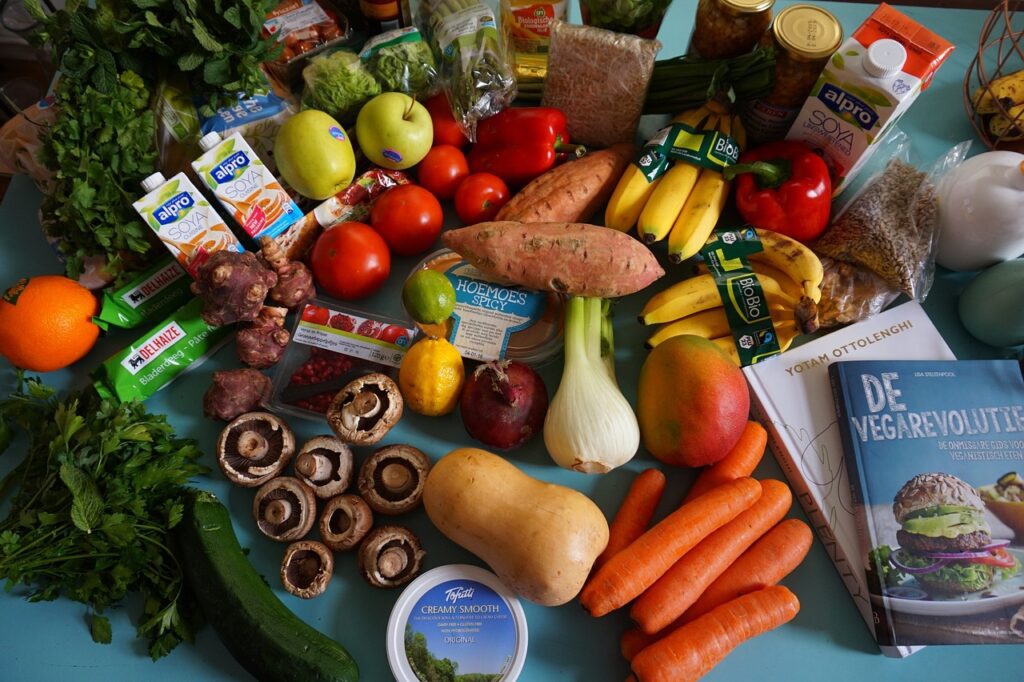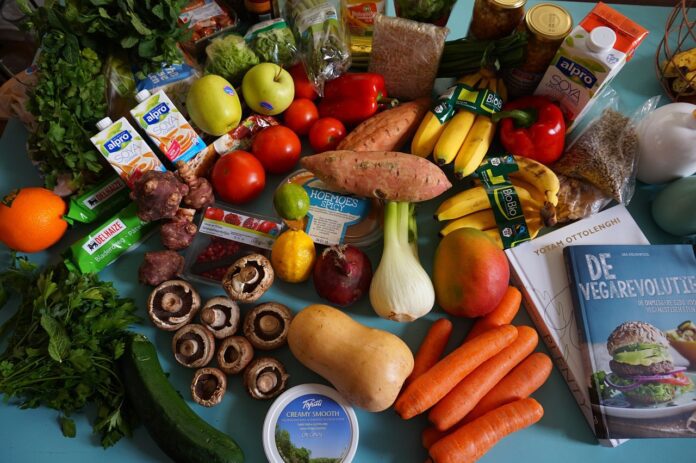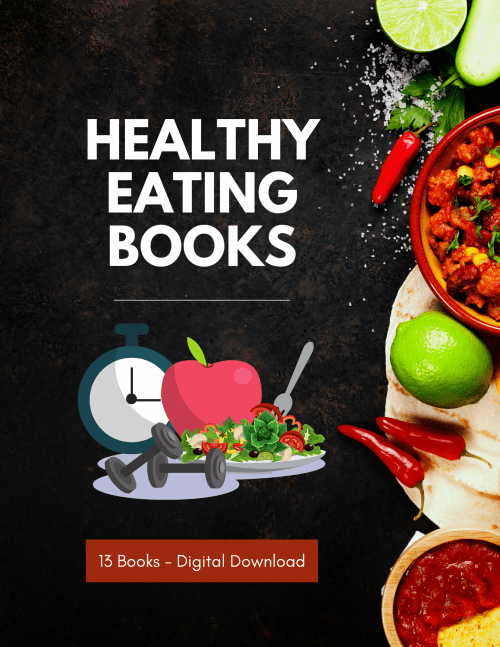Taking foods that has a balanced nutrient is very essential to the health of both the body and the mind. A well- balanced diet keeps our kidneys healthy and also fights diseases while making our bodies healthier and happier. Besides presenting specific guidelines for creating a healthy diet plan, viable as per your daily routine, this guide will explain the concept of proper eating. The 100 Cookbooks Bundle and the Healthy Eating E-book, as we have seen above, are books full of healthy meals and recipes for those who would like to take their healthy diets to the next level.

What is a Balanced Diet?
For the body to functioning optimally, balanced diet involves the right proportions of; water, vitamins, minerals, proteins, fats, and carbohydrates. For it is about taking the right combinations of meals that contain all the necessary components a person needs to live a healthy life.
Core Components of a Balanced Diet
1.Carbohydrates:
the primary energy source for the organism. Select fruits, veggies, and whole grains.
2.Proteins:
vital for cell proliferation, immunological function, and muscle repair. found in dairy products, legumes, nuts, and lean meats.
3.Fats:
vital to the health of cells and the absorption of nutrients. Choose good fats, such as those found in almonds, avocados, and olive oil.
4.Vitamins and Minerals:
These nutrients, which are present in fruits, vegetables, and proteins, are vital for good health.
5.Water:
essential for digestion, temperature control, and hydration.
In addition to improving physical health, eating a balanced diet can have a big impact on mental health by lowering stress and anxiety. Check out our 100 Cookbooks Bundle for simple dishes that make these nutrient standards come to life.
Core nutrients plays an important role in our diet.
It becomes very easy to forego bad foods when one understands the concept of macronutrients and micronutrients. Let’s dissect it:
Macronutrients
1.Carbohydrates:
essential for energy, thus active in the physical training and the operation of the mind.
Sources: Whole grain, fruits and starchy vegetables.
2.Proteins:
Help in tissues and enzymatic formation.
Sources: Lean meats, legumes, eggs.
3.Fats:
build up the fabric of the cells and help in the uptake of vitamins.
Sources: Nuts, seeds, olive oil.
Micronutrients
Vitamins:
Vitamin C: Reduces skin appearance and the immunity of the body.
Vitamin D: Essential for healthy bones.
Minerals:
Promote water, oxygen movement and strong bones formation.
Iron: Supplies the blood with oxygen.
Calcium: Strengthen bones including teeth.
Fibre and Water
Fiber: Improved digestion, increased satiety and could have beneficial impacts to weight control.
Water: The process required for digestion, regulation of body temperature, and detoxification.
If you are in need of further information about how to prepare more nutritious and balanced foods, the Healthy Eating E-book comes with a comprehensive nutrition advice, recommended recipes for each goal, and food plans.
Creating a Balanced Diet: Practical Tips
This just goes on saying that a balanced diet does not really have to be a complicated regime to follow. The following advice can help with weekly and daily meal planning:
1.Breakfast: They must select fruit, protein, and whole grains. For example, Greek yoghurt, with addition of berries and grains.
2.Lunch : Be sure to incorporate virtually all the foods you take in as vegetables, carbs and proteins. For example, Quinoa, Grilled Chicken and mixed greens on the side.
3.Dinner: Select your protein source, your vegetables, and your good fats. An example of a baked Salmon dish which has incorporated roasted vegetables.
4.Snacks: Avoid processed snacks and opt for foods that will provide the body with vitamins and minerals such as fruits, almonds, and yoghurt.
With the help of the guidelines provided in the Healthy Eating E eBook you can go on to learn how to make healthy eating fun and easily achievable and then explore the process of creating delicious meals that is right for you.
The Advantages demerit of Consuming Healthy
Nutrient Dense Foods I found out that among the other components of fitness, a balanced diet can boost mental and physical efficiency. Here are a few main advantages:
1.Improved Immune System: Others like Vitamin C and D for instance, help the body increase immunity to diseases as well as reducing the attack rates.
2.Improved Mental Health: The healthy diet good for mood and mental health includes antioxidants, B vitamins, omega-3 fatty acid.
3.Weight management: Consequently the natural foods are full of nutrients that help one to have a sense of fullness that makes it easy to stick to a healthy diet.
4.Reduced Disease Risk: The chronic diseases such as diabetes, heart diseases can be prevented virtually with right diet, some cancers too.
To start off with helpful and satisfying meals, look at the 100 Cookbooks Bundle packed with food options for healthy diets towards more lasting health.
Memory updated Below is the re-blog of the post with links to the Healthy Eating e-book and the 100 Cookbooks Bundle for better promotion.
The resources will be useful for building balanced diets, though the more detailed instructions will be found while readers follow this blog.
Eating Healthy and a Balanced Diet: A Comprehensive Guide The human body requires necessary nutrients and fossil fuels to function effectively and hence a healthy diet for health both within the brain and outside it. Proper nutrition supplies energy for the body, strengthens the resistance to infections, and improves our way of living. This guide will look at what healthy eating entails and offer practical advice on how to achieve a healthy diet plan for your lifestyle. For those of you who are interested in taking your healthy eating journey to the next level, there is the Healthy Eating E-book and the 100 Cookbooks Bundle brimming with nutritiously delicious recipes and diets.
What is a Balanced Diet?
A balanced diet therefore take the right proportions of the carbohydrate, protein, fat, vitamins, minerals and water necessary for the body’s efficient functioning.
Segment three is invariably about consuming generous proportions of different foods where all the ingredients required in a proper diet can be obtained.
Elements that conform to the basic nutrition guideline of a balanced diet
Carbohydrates: The body’s most favoured source of energy. Develop a propensity for combined complex carbohydrates in the form of whole grain foods, fruits, and vegetables.
Proteins: Essential in muscle build up, immunity and having a proper to grow a new cell. As found in lean meats, beans, nuts, and milk.
Fats: A composite
list of vitamins: Vitamins A, B-complex, C, D, E, K,
the minerals calcium, chlorine, magnesium, phosphorus, potassium, sodium and sulfur.
Choose fats that are good for your heart like olive oil, avocados, and nuts.
Vitamins and Minerals: Pro coloc Birds and amino acids are other nutrients which are vital and can be obtained from fruits, vegetables as well as proteins.
Water: Hyaluronic Acid – is essential mostly for maintaining the body moisture balance, temperature regulation, and digestion.
It is certainly not a secret that tom proper eating plan is very helpful when it comes to dealing with stress and anxiety. To learn more about these nutrient guidelines in an easy recipe format, please visit 100 Cookbooks bundle.
There is need for core nutrition since it enhances the general wellbeing of all human beings.
Macronutrient and Micronutrient knowledge assists in the selection of a better diet. Let’s break it down:
Macronutrients
Carbohydrates: Vital for energy used in cognition, and other physical exertions performed around the body.
Sources: Foods from the whole grains, fruits or starchy vegetables.
Proteins: Facilitating tissue repair and enzymes synthesis Generally, help in tissue repair and synthesis of some enzymes.
Sources: Lean meats, legumes, eggs.
Fats: It aids in absorbing vitamins and maintain cell wall.
Sources: Nuts, seeds, olive oil.
Micronutrients
Vitamins: Covers the gaps of the immune system and protects the cells of the body.
Vitamin C: Enhances immune system and it’s helpful for the skin.
Vitamin D: Crucial for bone health.
Minerals: They also help supporting the bone structure, oxygen transport and helps maintain hydration.
Iron: Carries oxygen in the blood.
Calcium: Strengthens bones and teeth.
Fibre and Water
Fibre: Is helpful to the health of your digestive system and helps one avoid over eating since it assists in reducing the portions to be taken.
Water: Required in the breakdown of foods, to control temperature and to excrete toxins from the body.
For more information about healthy eating, particularly about nutrition and balanced diet, there’s more information on nutrition articles, 7-day diet meal plans, and healthy recipes in Healthy Eating E-book.
Creating a Balanced Diet: Practical Tips
Balancing your diet does not have to be a difficult task to accomplish. Here are some tips for daily and weekly meal planning:
Breakfast: It should comprise whole grains, protein, and fruit.
Example: 200ml of greek yoghurt decorated with mixed berries and 2 teaspoonful of oats.
Lunch: Protein, carbohydrates, and vegetables should all be eating in moderation.
Example: Barbecue chicken with quinoa and a side dish of mixed salads.
Dinner: Select between vegetable, protein and healthy fat.
Example: Baked salmon with steamed vegetable and fired roasted potatoes.
Snacks: Instead of engulfing some layman-processed food items, try to go for foods which is highly nutritious such as fruits, nuts, yoghurt and the rest of them.
For more detailed information on how to develop a better diet plan that meets your ideal choices, use the Healthy Eating E-book a comprehensive guide that makes meal planning a good experience.
From the material presented it is evident that taking a balanced diet has enormous health benefits.
Proper nutrition will enhance most of the human aspects including physical, mental, and emotional states. Here are some key benefits:
Stronger Immune System: Minerals such as vitamin C and D boost the immunity system meaning that one will not easily fall sick.
Better Mental Health: It also reveals that foods containing omega 3 fatty acids, b vitamins and antioxidants enhance mood and mental performance.
Weight Management: It is possible to eat nutrient-dense foods that give satiety and thus extending the possibility of staving off overweight.”
Lower Disease Risk: The different component in the food we take plays a crucial role in cutting down the risk of various diseases such as diabetes, heart diseases, and some forms of cancer.
For a more real sense of these cookbooks and a ready supply of nutritionally healthy recipes for long-term sustainable diets, try out the 100 Cookbooks Bundle.
Data Table: Nutritional Value of Key Foods in a Balanced Diet
| Food Item | Calories | Protein (g) | Carbs (g) | Fats (g) | Key Vitamins/Minerals |
|---|---|---|---|---|---|
| Chicken Breast | 165 | 31 | 0 | 3.6 | B6, Niacin |
| Brown Rice | 218 | 5 | 45 | 1.6 | Magnesium, Phosphorus |
| Spinach | 23 | 2.9 | 3.6 | 0.4 | Vitamin K, Vitamin A |
| Almonds | 161 | 6 | 6 | 14 | Vitamin E, Magnesium |
| Salmon | 206 | 22 | 0 | 12 | Vitamin D, Omega-3 |
For more recipe inspiration using these foods, explore our Healthy Eating E-book or 100 Cookbooks Bundle
Questions and Answers (FAQs)
What is given in foods which is what constitutes a balanced meal?
To source several nutrients, the balanced meal must contain carbohydrates, which are complex, and a vegetable or a fruit and protein.
How do I begin eating better?
Make small portion sizes from processed foods, and substitute the processed foods with whole foods such as fruits, vegetables, and lean meat.
What’s the unit of water recommended for an individual to take per day?
Specific requirements may vary, but the recommendations make it necessary that each group should take not less than 2-3 liters daily.
It’s not a secret that most nutritionists recommend a balanced diet, but does it mean that we need supplements?
There is no need to take any supplements most of the nutrients can be found in the food that we need to include in our diet in large quantities.
What are the recipes if I want to take balanced diet?
In our 100 Cookbooks Bundle there is a great inspiration of healthy meals to enjoy and be motivated about.
In conclusion
From better energy and cognitive functions, to sound immunological protection, nutritious, balanced diet has long-term effects. Perhaps incorporating a few realistic changes you can make will get you on the boat to creating a wellness-promoting, sustainable eating pattern. For similar healthy diets resources also check out the 100 Cookbooks Bundle as well as the Healthy Eating E-book which includes the right diet plan for you and tasty meals to go with it. The guidance provided here will help you quickly adapt to a proper diet or make health an important goal in your life.




[…] “healthy eating.” Mostly, it entails choosing to take different meals that give your body the protein, fats, carbohydrates and vitamins and minerals in equal proportion. […]